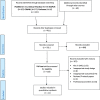The effectiveness of peer and community health worker-led self-management support programs for improving diabetes health-related outcomes in adults in low- and-middle-income countries: a systematic review
- PMID: 32505214
- PMCID: PMC7275531
- DOI: 10.1186/s13643-020-01377-8
The effectiveness of peer and community health worker-led self-management support programs for improving diabetes health-related outcomes in adults in low- and-middle-income countries: a systematic review
Abstract
Objective: Community-based peer and community health worker-led diabetes self-management programs (COMP-DSMP) can benefit diabetes care, but the supporting evidence has been inadequately assessed. This systematic review explores the nature of COMP-DSMP in low- and middle-income countries' (LMIC) primary care settings and evaluates implementation strategies and diabetes-related health outcomes.
Methods: We searched the Cochrane Library, PubMed-MEDLINE, SCOPUS, CINAHL PsycINFO Database, International Clinical Trials Registry Platform, Clinicaltrials.gov, Pan African Clinical Trials Registry (PACTR), and HINARI (Health InterNetwork Access to Research Initiative) for studies that evaluated a COMP-DSMP in adults with either type 1 or type 2 diabetes in World Bank-defined LMIC from January 2000 to December 2019. Randomised and non-randomised controlled trials with at least 3 months follow-up and reporting on a behavioural, a primary psychological, and/or a clinical outcome were included. Implementation strategies were analysed using the standardised implementation framework by Proctor et al. Heterogeneity in study designs, outcomes, the scale of measurements, and measurement times precluded meta-analysis; thus, a narrative description of studies is provided.
Results: Of the 702 records identified, eleven studies with 6090 participants were included. COMP-DSMPs were inconsistently associated with improvements in clinical, behavioural, and psychological outcomes. Many of the included studies were evaluated as being of low quality, most had a substantial risk of bias, and there was a significant heterogeneity of the intervention characteristics (for example, peer definition, selection, recruitment, training and type, dose, and duration of delivered intervention), such that generalisation was not possible.
Conclusions: The level of evidence of this systematic review was considered low according to the GRADE criteria. The existing evidence however does show some improvements in outcomes. We recommend ongoing, but well-designed studies using a framework such as the MRC framework for the development and evaluation of complex interventions to inform the evidence base on the contribution of COMP-DSMP in LMIC.
Conflict of interest statement
The authors declare that they have no competing interests.
Figures
References
-
- Chrvala CA, Sherr D, Lipman RD. Diabetes self-management education for adults with type 2 diabetes mellitus: a systematic review of the effect on glycemic control. Patient education and counseling. 2016;99(6):926–943. - PubMed
-
- Davies MJ, Heller S, Skinner T, Campbell M, Carey M, Cradock S, et al. Effectiveness of the diabetes education and self management for ongoing and newly diagnosed (DESMOND) programme for people with newly diagnosed type 2 diabetes: cluster randomised controlled trial. Bmj. 2008;336(7642):491–495. - PMC - PubMed
Publication types
MeSH terms
LinkOut - more resources
Full Text Sources
Medical
Miscellaneous


